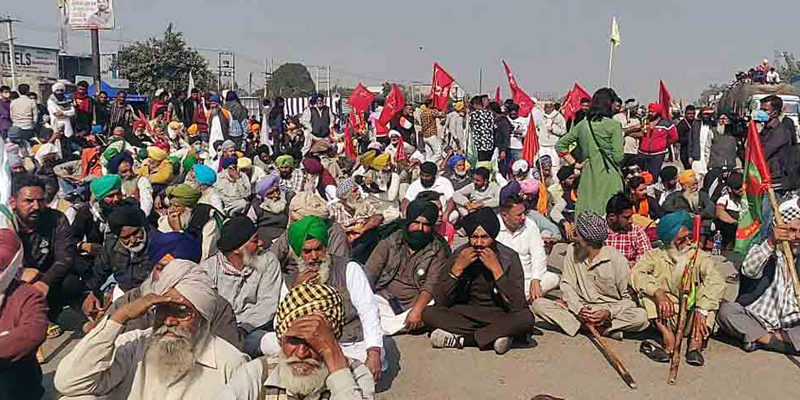After the Parliament passed thee laws related to agriculture, there has been an uproar across India. Lakhs of farmers (from more than 30 different farmers’ union groups) are gathered at different Delhi border points to protest against the laws; the agitation is likely to intensify if the government doesn’t recall the three laws which farmers call – Black Laws.
What Does the Government Say?
The three farm laws implemented by the government are projected as one of the most significant reforms in the Indian agriculture sector that will eliminate middlemen.
Previously, farmers could sell only at the mandis of APMC – Agricultural Produce Marketing Committee; however, with the Farmers’ Produce Trade and Commerce (Promotion and Facilitation) Act, 2020 coming into force, farmers are able to sell their produce outside APMC mandis, anywhere throughout the country.
What Are the Three Laws the Nation is Talking About?
- Farmers’ Produce Trade and Commerce (Promotion and Facilitation)
- Farmers (Empowerment and Protection) Agreement on Price Assurance and Farm Services
- Essential Commodities (Amendment) Law
Let’s now discuss some of the advantages and disadvantages of the three laws in brief.
1. The Farmer’s Produce Trade and Commerce (Promotion and Facilitation) Law, 2020
Advantages:
- Farmers will get the freedom to sell their produce at a place they choose, outside APMC mandis.
- The concept of ‘One Nation, One Market’ promotes interstate trading, eliminating all trade barriers.
- Encouraging farmers to engage in trade using electronic trading platforms, allowing them to save marketing and transportation costs.
- A dispute resolution mechanism is also introduced, under which farmers can avoid pending court litigation.
Disadvantages:
- The ‘mandi fees’ that state governments collect is a big source of revenue. As the farmers will be allowed to sell beyond APMC markets, the states will lose considerable revenue.
- As this rule eliminates the role of middlemen, commission agents’ business will be shut, and the farmers can sell directly to registered traders.
- The rule will put an end to the MSP based procurement system followed in India for decades.
- It will destroy the traditional mandi system.
2. The Farmer’s (Empowerment and Protection) Agreement of Price Assurance and Farm Services Law, 2020
Advantages:
- Farmers can enter into a commercial agreement with retailers, wholesalers, exporters, and food product manufacturers, etc., eliminating their fear of exploitation and allowing access to the global market.
- This rule now allows buyer-enterprises to invest in technology and infrastructure to foster agriculture sector and boost food grain production. This will help farmers to reduce farming costs and increase income.
- Once the contract terms are finalised, the buyer shall provide farmers with the means needed to yield a good crop.
- The contract will strictly be for agriculture produce and not for the land used for it. Hence, the farmers will remain the owner of their land can utilise loan, credit facilities from financial institutions whenever needed.
Disadvantages:
- The corporates and traders are likely to have the upper hand and can be smart players, whereas, farmers usually have negotiation skills too weak to lock a profitable deal.
- The small and marginal farmers may not benefit from this rule, as they may be deprived of sponsors.
- In case of disputes, corporates, exporters, and sponsors will have an advantage edge.
- This law grants independence to corporates and not to farmers as the MSP is not mentioned anywhere in the law papers; this is one big reason behind the on-going protest.
3. The Essential Commodities (Amendment) Law, 2020
Advantages:
- This law allows private investment in the agriculture sector to provide farmers with a massive pool of funds, facilitating production.
- It will help both farmers and consumers to ensure price stability.
- Government has removed onions, potatoes, cereals, pulses, oil seeds, etc. from the list of essential commodities and eliminated stock holding limits.
- It will encourage investments from the private sector in cold storage, leading to supply chain modernisation.
- With the removal of stock limits, farmers can attract a large market to invest in infrastructure and transportation as now there are fewer government restrictions.
Disadvantages:
- Since there are no limits for stocking commodities, big companies can charge highly exorbitant prices, leading to farmers’ exploitation.
- The price limits the government has set for “extraordinary circumstances” are too high and likely not to be implemented ever.
Farmers Union from Punjab, which is also a part of “Delhi Chalo” march, are protesting against the three farm laws passed by the Centre. The core motive of the march is to voice their demands, seeking the Centre’s surrender before the farmers. The government has deployed heavy security forces at Delhi-Haryana border areas which are the prime locations of the protest.
The “Delhi Chalo” March: Why are Farmers Angry?
- Farmers are refusing to accept all three new legislations. Farmers believe that with mandi system getting dismantle, they will not get assured procurement of their crops at suitable MSP.
- They demand that the government should guarantee MSP in writing; otherwise, the free hand given to private corporate houses will result in their exploitation.
- Commission agents, commonly called ‘Arthiyas’, and farmers want to remain in the friendly bond that has been in place for decades. Each Arthiya, on an average, deals with around 300 farmers, taking care of their financial loans, ensuring fair prices and timely procurement for their corps.
- Farmers believe the new laws will break their relationship with Arthiyas and corporates will not be as sympathetic towards them as these agents have been in times of need.
Farmers’ Demands
- Reversal of all three laws.
- Keep the mandi system in place.
- Their loans should be cleared.
- A law should be brought for MSP to be at least 50% more than the weighted average cost of production; make ‘not paying the set MSP’ a punishable crime.
- A law should be implemented that ensures payment from the buyers through middlemen. This has always been the norm in order to make sure banks don’t deduct any money form the farmers’ accounts in the name of loan recovery.
Conclusion
The laws have created mistrust in farmers towards the government that is highlighting the positive aspects of the laws as the opportunity to modernise the agriculture sector in India. However, the government should take the responsibility to consider farmers’ and states’ opinions before passing such laws.
Besides, the primary thing that the government should focus on in the first place for the betterment of farmers is strengthening the APMC mandis and eliminating loopholes in them.
At Apni Kheti, we always support farmers and their interests, for which we frequently post informative articles that help them become aware of the latest agriculture laws and trends. To learn more about farming, farm equipment, seeds, plant diseases, pesticides, etc., and to get the latest news and updates from the agriculture world, download the Apni Kheti app now.
For more information about Agriculture and Livestock, download Apni Kheti app – Android, iPhone





